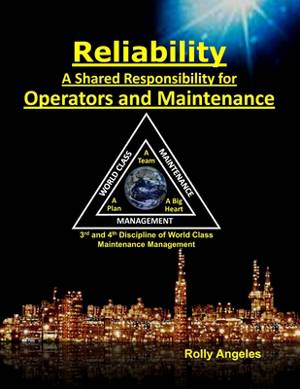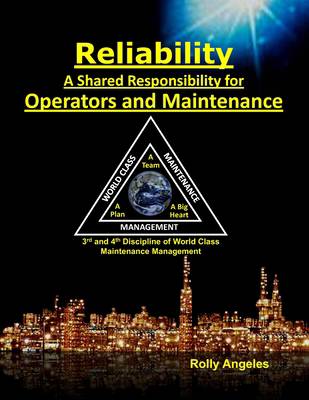
- Afhalen na 1 uur in een winkel met voorraad
- Gratis thuislevering in België vanaf € 30
- Ruim aanbod met 7 miljoen producten
- Afhalen na 1 uur in een winkel met voorraad
- Gratis thuislevering in België vanaf € 30
- Ruim aanbod met 7 miljoen producten
Reliability - A Shared Responsibility for Operators and Maintenance
Sequel to World Class Maintenance Management - The 12 Disciplines and Maintenance - Roadmap to Reliability
Rolly AngelesOmschrijving
One of the questions being raised on maintenance is, do operators need to be involved in maintenance? One of the wisdom TPM has taught me is the involvement of operators in maintenance. While in most industries, especially manufacturing, feud, and friction exists between these two functions which only result in more chaos and problems. Japanese industries do things differently. They know the importance of involving operators in sustaining their equipment and assets.
Operators are important in any maintenance strategy for 2 good reasons. First, these people will be the first who will experience and come face to face with failures before the maintenance function. This means that these people are the first line of defense in any equipment-related failures and breakdowns on the equipment. But this can only be possible if operators know their equipment intimately. Second, maintenance can only perform the function of preserving and sustaining their equipment if operators will also involved.
Autonomous Maintenance is one of the pillars of TPM that will involve operators. This is done in 7 steps excluding Step 0 which is the Preparatory Step. The main goal of doing Autonomous Maintenance is to establish the basic equipment condition as well as empower operators.
One of the problems the author experienced in implementing this TPM pillar is how to accomplish each step of Autonomous Maintenance. This is what this book is all about. While there may be many consultants that teach its principles. What is important is to provide a detailed roadmap on how each of the steps is being done. Developing the details and guidelines on how to proceed with each step takes time to develop. The good news is that this book contains all the details from Step 0 until the last detail in Step 7. What took me years to accomplished will just take the people involved in this feat to read this book.
Some highlights of this book include:
- Why Operators are Important in the Reliability Strategy
- What Maintenance is all About
- Survey on Top Problems of Preventive Maintenance Revisited 2018
- Why Preventive Maintenance cannot prevent "ALL" failures
- Operations and Maintenance - Will the Feud Ever Stop?
- Reducing Human Errors in Maintenance
- Why Operations and Maintenance Went their Own Separate Ways
- Understanding Human Errors
- The Common Thing RCM and TPM Both Believe
- Strengthening Operator and Maintenance Partnership
- Detailed Guidelines in Implementing 7 Steps of Autonomous Maintenance
- Tips in Implementing Autonomous Maintenance
- Detailed Guidelines in Implementing the 4 Phases of Planned Maintenance
- Tips in Implementing Planned Maintenance
- Why Do Most RCM Initiatives Fail?
- Detailed Guidelines in Implementing RCM Analysis for Equipment
- Tips in Implementing the RCM Analysis
- Detailed Guidelines on How to Perform Root Cause Failure Analysis Probe
- Tips in Implementing Root Cause Failure Analysis
- Guidelines in Conducting Equipment FMEA/FMECA
- Tips in Implementing FMEA/FMECA
- Small Problems matter most
- The Biggest Missing Link in Any Reliability Strategy
- Changing the Image of the Maintenance Function
- It Will Definitely Take Time for Industries to Accept
- The Separation Needs to End, and a Partnership Needs to Begin
- Managing Human Errors in Maintenance
- How to Strengthen Operators and Maintenance Partnership
- Tips and Guidelines in Implementing TPM Focused Improvement and many more.
Specificaties
Betrokkenen
- Auteur(s):
- Uitgeverij:
Inhoud
- Aantal bladzijden:
- 412
- Taal:
- Engels
- Reeks:
- Reeksnummer:
- nr. 3
Eigenschappen
- Productcode (EAN):
- 9781982963705
- Verschijningsdatum:
- 21/08/2018
- Uitvoering:
- Paperback
- Formaat:
- Trade paperback (VS)
- Afmetingen:
- 216 mm x 279 mm
- Gewicht:
- 948 g

Alleen bij Standaard Boekhandel
Beoordelingen
We publiceren alleen reviews die voldoen aan de voorwaarden voor reviews. Bekijk onze voorwaarden voor reviews.











